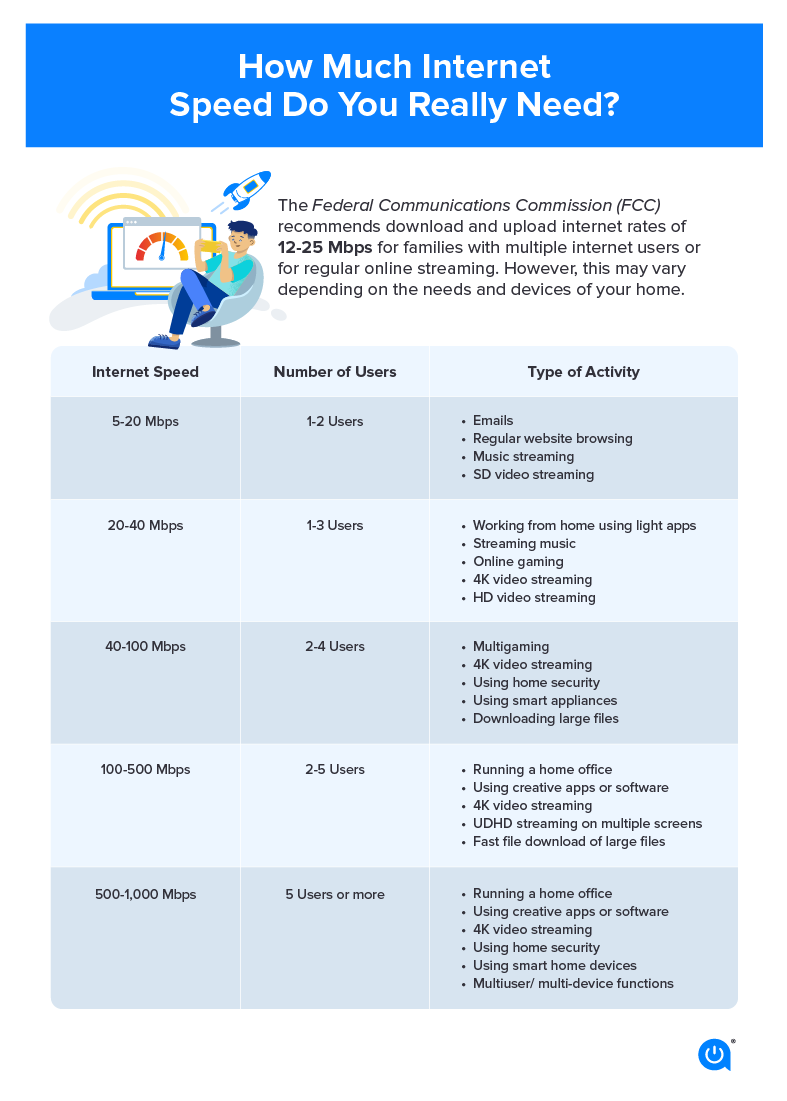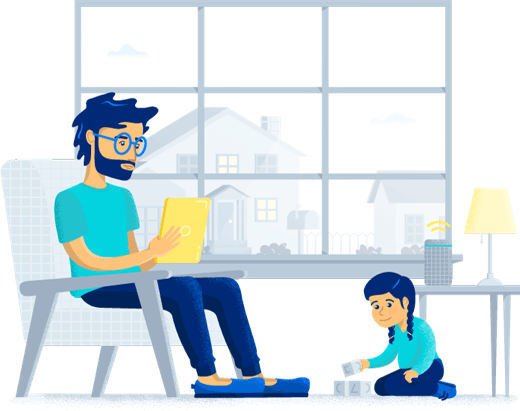Quick tips for finding the right internet speed
- 200 to 400 Mbps plans will keep a family of 4+ seamlessly online
- You need at least 25 Mbps for 4K streaming video
- For a consistently good gaming experience, you need over 25 Mbps
If you’re shopping for a new internet service provider, you may ask what internet speed you need or how many megabits per second (Mbps) you need. Choosing the optimal amount of Mbps for your internet speed needs is a big deal. The wrong choice can leave you stuck with too little speed, and the spinning “loading” wheel becomes a norm, or when you’ve got too much speed and you’re paying for much more than you need. So what is a good internet speed?
As of November 2023, Ookla’s Speedtest.net shows Americans are getting almost 220 Mbps of download speed.
Currently, the Federal Communications Commission (FCC) recommends at least 25 Mbps of download speed, allowing you to check your email, browse the internet and watch a video, but on one device at a time. While 25 Mbps is currently the broadband standard, this speed is too low to accommodate active daily internet users.
Most of us have internet needs that go beyond the basics, like joining in video conferences, working and learning from home and online gaming, with multiple users in our household trying to access all of that at once on many devices. As our internet use has increased and we rely on it to perform more functions, the FCC is considering raising the minimum definition of “fast” internet to be at least 100 Mbps.
What internet speed do I need?
So, what speed is right for you? The best download and upload speeds for you depend on how you use the internet at home. More than 90% of Allconnect readers who took our internet speed quiz stream TV daily, and more than 25% stream Ultra HD daily, which means fast internet speeds to them are closer to 100 Mbps.
If you have a household of four people, you can most likely make do with a 100 Mbps plan. However, keep in mind that depending on what the four of you are simultaneously accessing online may lead to some lag in your video meeting or your child’s online game.
200 to 400 Mbps plans may be worth the extra money monthly for some families simply for peace of mind that you aren’t going to freeze in the middle of that important meeting with your boss or lose all of your progress in your latest game.
Keep in mind, too, that having a mid-sized household on a 100 Mbps plan, while doable, may cause some issues during peak usage time for your provider. There isn’t much left to pull from when your neighbors are all online, your kids and your partner are streaming and gaming and you are trying to hold a video meeting.
Once you sign up for a plan, take the speed test occasionally to ensure that you are getting the speeds you pay for.

How can I determine my current internet speed?
You can measure your current internet speed by taking an internet speed test on a computer connected to your home network. Many internet speed tests also tell you your ping time and differentiate your connection’s upload and download speeds.
Need more for the price?
Try these helpful hacks to improve your internet speed. Or if you just want more bang for your buck, check out providers near you with more speed for the price. Either way, we’ll help you find what you need.
View providers near meRather chat? Give us a call: (844) 451-2720
Rather chat? Give us a call: (844) 451-2720Pro Tip: For best results, use an Ethernet cord to connect your router or modem directly to your device before you run the test.
How much internet speed do I need for streaming?
| Activity | Minimum download speed |
|---|---|
| Streaming online radio | 3 – 4 Mbps |
| Streaming standard definition video | 5 – 8 Mbps |
| Streaming high definition (HD) video | 25 Mbps |
Depending on what types of specific activities you’ll be doing, the internet speed needed for streaming might change. For example, streaming Spotify music will require less speed than streaming videos or shows. In general, to stream most videos in standard definition, you’ll need download speeds of at least 3 Mbps. You need at least 25 Mbps for 4K streaming video on your computer or Ultra HD-enabled devices.
For Netflix, the minimum internet speed recommended for streaming is 3 Mbps, but recommended speeds vary by the quality you want to view.
- To stream videos in standard definition, at least 1 Mbps is recommended.
- To stream videos in HD, at least 3 Mbps is recommended.
- To stream in FHD, at least 5 Mbps is recommended.
- To stream videos in HDR or 4K, at least 15 Mbps is recommended.
In contrast, for the best video quality, Hulu recommends 3 Mbps for on-demand viewing, 8 Mbps for Live TV viewing and at least 16 Mbps for 4K content.
For streaming live TV with DIRECTV Stream, you’ll want a minimum internet speed of 2.5 Mbps, however, you may want to consider higher speeds based on your device. According to DIRECTV:
- To stream videos at home in HD, 8.0 Mbps is recommended per device.
- To stream on a mobile device using data, 150 Kbps to 2.5 Mbps are recommended for standard-definition streaming, and 2.5 to 7.5 Mbps are best for high-definition
YouTube TV recommends a minimum internet speed of 3 Mbps, but advises that how much speed you need may vary by video quality.
- To stream videos in standard definition, at least 3 Mbps is recommended.
- To stream video on one device in HD, at least 7 Mbps is recommended.
- To reliably stream HD with other devices on the same network, 13 Mbps is recommended.
- To stream 4K content, at least 25 Mbps is recommended.
Recommended internet speeds for gaming
| Activity | Minimum download speed |
|---|---|
| Game console connecting to the internet | 3 Mbps |
| Online multiplayer | 4 Mbps |
For a consistently good gaming experience, you need over 25 Mbps. As you search for the best internet for gaming, keep in mind that download speed isn’t the only factor in a good gaming experience.
Speed is important because it’s how quickly your device transfers information from the gaming server. However, ping time and latency also matter.
- Nintendo Switch requires a minimum download speed of 3 Mbps and a minimum upload speed of 1 Mbps.
- PlayStation 5 requires at least 5 Mbps download and upload speeds.
- Xbox One requires 3 Mbps of download speed and a minimum of 0.5 Mbps upload speed.
Check your latency
Ping time, or latency, is more important for gaming than internet download speeds. A ping time of 20 milliseconds or less is great, while 20-100 milliseconds will give you a good gaming experience.
Generally, higher speed plans will have lower latency, as it takes the data less time to travel. The FCC reported in the latest fixed broadband report that the average “measured median latencies ranged from 8 milliseconds to 28 milliseconds” in the ISPs they studied. Those included Frontier, Windstream, Optimum, Comcast, Cox and others.
Ping time can improve based on your download and upload speeds. However, factors such as your local area connection and internet latency affect your ping time more than internet speeds.
But, how does one go about finding out their ping time and are there ways to improve it that are in your control? To determine your ping time, run a simple internet speed test like the one above. In the results, you’ll find download and upload speeds, ping, jitter and loss. If your ping is higher than optimal, here are some things to do to help lower it:
- Make sure your router firmware is up-to-date.
- Reduce the number of devices on the network.
- Make sure there are no auto-updates scheduled during your gaming time.
- Close all background applications and programs.
- Clear router and modem caches.
Best internet technologies for online gaming
The best internet for gaming is usually cable internet or fiber optic internet since they both provide low-latency internet connections, which means lower ping time.
Satellite internet tends to have high latency, even with fast download speeds, because the internet signal must travel so far between its source (a satellite) and its end destination (your device).
Best internet for gaming in rural areas
When available, fixed wireless internet is a better option for gaming than satellite in rural areas.
Fixed wireless internet has lower latency than satellite because fixed wireless internet signals don’t travel through the atmosphere. Instead, they travel from a local tower directly to your home antenna. Fixed wireless internet also offers speeds comparable to cable and DSL internet.
Avoid satellite internet for real-time gaming
Satellite internet does not work well with sports or shooter games because they require rapid data response times. Other online games such as card games, role-playing games, strategy games or puzzle games tend to work fine with satellite internet.
Do online games block satellite internet users?
Since many people around the world play sports and first-person shooter games simultaneously, these types of games may block satellite internet users from playing because of the inherent latency of satellite internet. They block satellite users to prevent people from using lag to their advantage and compromising the gaming experience for other players.
How to improve your internet speeds for online gaming
To make your internet faster at home, you could boost your Wi-Fi signal to lower your latency. Resetting or moving your router can boost and stabilize your signal. You could also add a Wi-Fi repeater or extender to improve internet signals for gaming devices further away from your router.
You can also shop for a different high-speed internet service with faster speeds and a potentially more reliable connection.
How much internet speed do I need to work remotely?
The COVID-19 pandemic enabled many of us to work from home, which saw us relying on our internet connections much more heavily to accommodate the new lifestyle.
The good news is that you probably don’t need to upgrade your internet connection to start working from home. Most work activities have relatively low bandwidth requirements.
![]()
If you can stream Netflix, you can use Zoom successfully.
The best internet speed for working from home depends on what kind of work you do. If you frequently download and upload large files and participate in video meetings, we recommend at least 25 Mbps of download speeds for households with only one person working from home at a time. Here’s how much internet speed some of the most common work apps require:
| App | Recommended download speed | Recommended upload speed |
|---|---|---|
| Zoom | 2 Mbps | 2 Mbps |
| Cisco Webex | 0.5 – 2.5 Mbps | 0.5 – 3 Mbps |
| GoToMeeting | 0.7 – 2 Mbps | 0.7 – 2 Mbps |
| Slack | 0.2 – 4 Mbps | 0.1 – 0.6 Mbps |
| Spotify | 0.1 – 0.3 Mbps | N/A |
| 1 Mbps | 1 Mbps |
A word of caution: These numbers look incredibly low compared to the 25 Mbps we recommend for working from home, but apps generally underestimate how much speed you’ll need to use their products smoothly.
As researchers at San Francisco State University found, “speeds below 5 Mbps are not adequate for two-way interaction” on Zoom. For glitch-free video meetings, they recommend at least 20 Mbps download and 3 Mbps upload speeds. And if there are other devices connected to your Wi-Fi while you’re on a Zoom meeting, you’ll need even more.
If you’re not sure how much speed you need — or even how much you’re currently getting — you can use our speed test and quiz above to gauge your situation.
How can I boost my internet speed to work from home?
There are a number of steps you can take to help get your internet speed up to a comfortable level for working from home. Here’s how to get the most out of your connection:
- Update your router’s security settings: Unfortunately, Wi-Fi leeches are a common issue slowing down home internet speeds, especially if you live in close proximity to your neighbors. We recommend upping your network security by protecting access to your router with a complex password and WPA2 security.
- Optimize your router: You can try things like turning off your router’s entertainment settings, resetting the Request to Send (RTS) thresholds and changing the router’s fragmentation and RTS threshold settings.
- Use a new Wi-Fi channel: Switching your router from a standard 2.4 GHz Wi-Fi channel to a 5 GHz channel can help reduce interference and provide a boost to your internet speeds.
- Move your router: One of the least technical but most effective troubleshooting steps you’ll find. Simply moving your router to a more elevated, clearer spot can have a dramatic impact on speed.
- Use a wired connection: If you can set up your home office next to your modem, running an Ethernet cable straight to your computer can significantly improve your connection speed and stability.
- Reset your router: When in doubt, simply unplug your router and plug it back in. Believe it or not, a hard reset can sometimes fix issues that have been slowing down your connection.
If none of these steps increase your speeds enough, you might have to start spending money to see improved results. Mesh networks use several small routers to spread your Wi-Fi connection throughout the home and are particularly useful in bigger houses. Similarly, Wi-Fi extenders cost anywhere from $20 to $200, and extend your internet to rooms that are blocked due to walls, furniture or spacing issues. Finally, if you’ve had the same Wi-Fi router for a while, we recommend replacing it every four years to make sure you’re getting the most out of your internet connection.
Learn more about boosting your Wi-Fi signalIf you’re learning from home, it’s wise to optimize your internet connection similarly. Learning from home requires enough speed to video chat, download, upload, etc., so be sure to account for these types of activities when choosing or boosting your speed.
Prioritize your work connection
If other people are in the house using the internet during work hours, it can be helpful to keep that traffic separate. As mentioned above, most routers come with both the 2.4 and 5 GHz bands, which can be split into two different networks. In general, the 5 GHz band provides faster speeds, while the 2.4 GHz band has better range. Dedicating one of those bands to work activities and one to everything else can help send your bandwidth where it’s needed the most. If you really want top speeds, you can even update your router to a tri-band device that has the 6 GHz band, which allows for even more bandwidth.
Most routers also have the ability to create a guest network, often with max speed settings that can make sure your bandwidth isn’t being capped out while you’re working. Some routers even have Quality of Service settings, which let you prioritize traffic to specific devices. If working from home looks like it will be a permanent part of your future, it might be worth investing in a new router with these features.
Don’t forget to secure your home network
It’s one thing for your personal Instagram account to be hacked. But leaking your employer’s sensitive data due to an unsecured network? That’s a much more serious problem for you and your company. Taking steps like encrypting your Wi-Fi signal, updating your router’s firmware, and using a VPN (virtual private network) like ExpressVPN is essential to keeping your work life secure.
Learn more about securing your internet connectionInternet speed FAQs
The current fastest widely available home internet speed is 10,000 Mbps, or 10 Gbps, offered by several ISPs.
Ping time is the responsiveness of your connection, or how fast that data packet travels to the server and back. Ping time is measured in milliseconds. If your connection doesn’t register the data request for a couple of seconds, you may still see a lag in your game, file upload, online submission or other activity.
Latency is how fast data transfers between a source and its destination — basically a delay of information communication. For instance, if you’re in the U.S. playing a game with a server in China, you will have a higher latency than someone playing the same game in China.
Mbps is how internet speeds are gauged and it means “megabits per second.” It measures the bandwidth of an internet connection — how much data can be transferred each second.
Download speed is how fast your internet connection can transfer data from a server to you. Download speeds are important for downloading files, loading a website, streaming a video or streaming music. Upload speed is how fast your internet connection can transfer your data to a server. Upload speeds are important for sending emails, sending files to other people, live video chats and gaming.
No matter what you use the internet for at home, we recommend getting slightly faster speeds than Netflix, Skype, online shopping or any other activity requires. Internet speeds often perform slower at home than advertised. Having multiple devices at home will eat up bandwidth, and a variety of technical factors can also slow down your connection.
For researchers and journalists
If you would like to know more about this topic, we can assist you. Our experts can help you dig deeper into the data.
Email our expertsAllconnect: Let us compare providers for you
Why should you choose Allconnect? We’re the #1 broadband marketplace in the U.S, meaning you can trust us to search, compare and order internet and TV service for your home.
Get started

Written by:
Joe SupanPrincipal Writer, Broadband Content
Joe is a senior writer for CNET covering home technology and broadband. Prior to joining CNET, Joe led MYMOVE’s moving coverage and reported on broadband policy, the digital divide, and privacy issues for the br…
Read more
Edited by:
Robin LaytonEditor, Broadband Content
-
Featured
![Report: Wednesday is the best weekday for fast internet speeds]() Report: Wednesday is the best weekday for fast internet speeds Lisa Iscrupe — 5 min read
Report: Wednesday is the best weekday for fast internet speeds Lisa Iscrupe — 5 min read -
Featured
![What is a good internet speed?]() What is a good internet speed? Camryn Smith — 7 min read
What is a good internet speed? Camryn Smith — 7 min read -
Featured
![Advertised vs. actual internet speeds — Are you getting the internet speeds you pay for?]() Advertised vs. actual internet speeds — Are you getting the internet speeds you pay for? Joe Supan — 5 min read
Advertised vs. actual internet speeds — Are you getting the internet speeds you pay for? Joe Supan — 5 min read
Latest
-
Wednesday, April 17, 2024
Verizon offers free or discounted internet for qualified customersRobin Layton — 3 min read
-
Tuesday, April 16, 2024
Internet basics: A complete guide for older adultsRobin Layton — 20 min read
-
Tuesday, April 16, 2024
Report: Internet users are gobbling data by more than a half-terabyteRobin Layton — 4 min read






